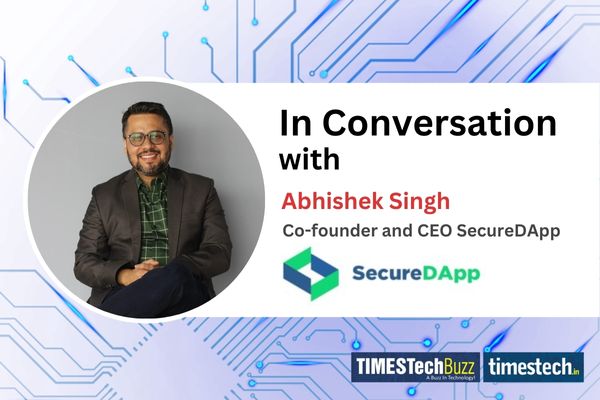In an interview with TimesTech, Abhishek Singh, Co-founder and CEO of SecureDApp, discussed how his company is reshaping blockchain security. With advanced tools for smart contract monitoring and real-time transaction tracking, SecureDApp aims to strengthen the Web3 ecosystem by reducing security risks and fostering greater adoption globally.
Read the full interview here:
TimesTech: In what ways does SecureDApp aim to reshape the future of blockchain security, and how do you see this impacting the broader Web3 ecosystem?
Abhishek: SecureDApp was established to revolutionize the blockchain security industry by providing the tools that enable developers to improve the security of their projects. Real-time monitoring of smart contracts and decentralized applications (Dapps) is one of our key concerns. This enables us to investigate difficulties or bugs before they come to be critical, and that is especially significant in the rapidly evolving blockchain sphere.
With such development to security, SecureDApp aims at enhancing credibility on blockchain technology. Due to multiple incidents of hacking and security breaches in the past the adoption of blockchain technology is still a concern to many people. If they feel more safe then more users and developers will join Web3, which is the new era of the Web that is based on decentralization and block chain.
In the long term, the work of SecureDApp will contribute to the reduction of the threat of theft and fraud in Web3. This makes it possible to fuel better security and adoption, which in turn increases the number of decentralized platforms and projects in the industry. The goal we have set as a company is to develop applications that increase the effectiveness of blockchain security for all individuals.
TimesTech: How does SecureDApp plan to expand its reach and influence globally while staying true to its mission of democratising security in the blockchain space?
Abhishek: Regarding the expansion strategy, new services will be called SecureDApp that aims to take its services international through partnerships and collaborations in both developed and developing countries. We are currently in the process of developing the network involving large industry stakeholders, governments, and such institutions as universities. This network will assist us in sharing information about blockchain security and make our instruments available to individuals around the planet.
We also expect to organise decentralised hackathons , presentations of webinars, and other community-driven events to raise awareness on the need for more robust blockchain security. Thus, it is still possible to remain loyal to our mission to democratise security by adapting to the consumers of different territories. Education and accessibility remain our primary objectives, so even as we grow, our efforts are directed towards the general blockchain ecosystem.
TimesTech: With the rise of DeFi and decentralised applications, how is SecureDApp evolving its security protocols to handle the complexity of these systems?
Abhishek: While DeFi and dApps are steadily gaining traction, as they evolve they do so to encompass more elaborate functions and higher levels of vulnerability to attacks. Security in the blockchain domain is being transformed, and SecureDApp is adapting to these changes. It means our priority is to build multi-level solutions capable of addressing the issues inherent in DeFi platforms and dApps.
One of the critical areas we are doing this is through smart contract auditing. In the course of deploying a smart contract which is an open piece of code to the public, there must always be a review for any loophole that may be exploited by hackers to hack into the code and make off with the assets. Furthermore, our second tool can monitor transactions inbox, which makes it easier to undertake live monitoring to detect suspicious activities. This is especially vital for the DeFi platforms that operate with significant amounts of money, and the companies are typical targets for cyberattacks.
For further augmentation of security, we pay equal importance to the decentralized governance models and the threats linked to them the possibility of vote manipulation or governance attack. So SecureDApp is equipped with the latest dangers and developing the required instruments, which helps DeFi platforms and dApps to progress within the growing blockchain space securely.
TimesTech: How does SecureDApp’s approach to security differ from traditional cybersecurity methods?
Abhishek: At another level it can be seen that SecureDApp has a distinctive way of dealing with blockchain security as compared to more conventional means of cybersecurity. In conventional security, the concentration is on securing unitary structures such as company servers, where one party owns the data. The most common measures to counter such threats are a firewall installation, antivirus software, and other comparable tools impending threats originating from the outside world.
In the real blockchain environment, the security issue becomes more critical because there is no central authority to govern the data. However, the use of the blockchain means that control is distributed among all the users of the chain. SecureDApp is different from other tools because our tools are dedicated to maintaining dApps and smart contracts’ security by scanning them for weak points through the use of AI audits. We also perform transaction surveillance to identify incongruent activities.
While other approaches simply prevent threats from coming in, ours is different – it is an active one. Our job entails trying to look for problems before they actually turn into problems. Furthermore, since blockchain carries immutable data and transactions, we focus on avoiding issues in the first place. Thus, SecureDApp has developed security solutions that reflect the demands of Decentralised Systems.
TimesTech: Given the alarming statistics of losses in smart contract hacks and other blockchain breaches, how does SecureDApp ensure the robustness and cost-effectiveness of its security solutions?
Abhishek: Smart contract hacks and blockchain breaches have caused significant financial losses in the industry, so SecureDApp focuses on building solutions that are both strong and affordable. We achieve this by using a combination of automated tools and constant monitoring. For instance, our smart contract auditing tools automatically scan code for any weaknesses before the contract goes live, preventing vulnerabilities from being exploited.
Additionally, our real-time monitoring system tracks blockchain transactions as they happen. If anything suspicious occurs, alerts are triggered immediately, allowing quick responses to potential threats. By relying on automation, we reduce the need for manual work, which makes our security solutions more cost-effective for clients of all sizes.
At SecureDApp, we also recognize that blockchain projects come in all shapes and sizes, from small startups to large enterprises. That’s why our solutions are designed to scale, offering affordable pricing to smaller projects while maintaining top-tier security. Our continuous audits and monitoring ensure that security stays strong without breaking the budget, providing an effective solution for the long-term protection of blockchain platforms.
TimesTech: What are the core products and services offered by SecureDApp, and how do they address the most pressing security needs in the Web3 space?
Abhishek: SecureDApp offers several key products and services to safeguard decentralized applications, smart contracts, and blockchain platforms of Web3. Its primary services are smart contract audit, real-time transaction monitoring and automated threat identification.
Our smart contract auditing service examines the code of smart contracts for vulnerabilities before they are deployed. This avoids the creation of further vulnerabilities that hackers could use and guarantees that blockchain projects are protected from the beginning. Our monitoring tool runs in parallel with the blockchain and continuously monitors transactions for any abnormal activities. With various features automated and checked constantly, if something appears to be a little off, we alert as this can be dealt with fast.
Furthermore, SecureDApp provides information and an assistance service for developers to design safer apps. To us, security remains an integral part of the development process of a dApp, in the development of the dApp as well as in the execution of the dApp’s functionality. This synergy of product and service makes it possible for Web3 projects to have the required safeguard that will enable them to succeed in the ever changing environment.
TimesTech: Can you discuss any upcoming product that SecureDApp is working on that you believe will significantly impact the industry?
Abhishek: SecureDApp is excited to introduce two new products that will greatly improve blockchain security: SecureWatch and SecureTrace.
SecureWatch is a tool that continuously monitors smart contracts and blockchain systems for any signs of trouble, like potential hacks or weaknesses in the code. It works in real-time, meaning it can catch problems as they happen and alert developers immediately, helping them fix issues before they cause harm.
SecureTrace is a forensic tool that tracks suspicious activities and transactions on the blockchain. This product is especially useful for tracing where stolen funds or illegal activities have occurred, making it easier for organizations and authorities to investigate and stop cybercrimes. It can help track down fraud, theft, and other criminal activities that might otherwise go unnoticed in the decentralized world of blockchain.
Together, SecureWatch and SecureTrace will make the blockchain ecosystem much safer. These tools not only protect projects from being hacked but also ensure that suspicious activity can be traced, promoting trust and transparency in the blockchain industry.
TimesTech: What long-term goals has SecureDApp set to fulfil its mission of creating a safer, more inclusive Web3 environment? Where do you see SecureDApp in the next five years? What milestones are you targeting in the next few years?
Abhishek: Ultimately, SecureDApp aims at enhancing security in the entire Web3, which is essentially everything based on blockchain. Our ultimate goal is to foster an environment that would guarantee the safety of developers’, users’, and project’s dollars and dimes against various threats. To achieve this, we envision that we will enhance the usability of security tools across various sectors of blockchain technology that include DeFi, NFT, Decentralized Identity, among others.
Over the course of the next five years, our primary focus will be on strengthening our collaboration with large-scale blockchain platforms and protocols to turn SecureDApp into a dignified industry member. We also aim to extend our reach to the regions that have not been targeted sufficiently, so that the security solutions could be provided to the blockchain developers and projects globally. Another step in this process is to release an open-source framework or library that can be incorporated into projects by developers.
So, by 2029, it is expected that SecureDApp will be among the leading companies specializing in the blockchain’s security on an international level. Our mission is to develop and maintain a safer Web3 environment, as well as contribute to setting best practices for decentralized security.












